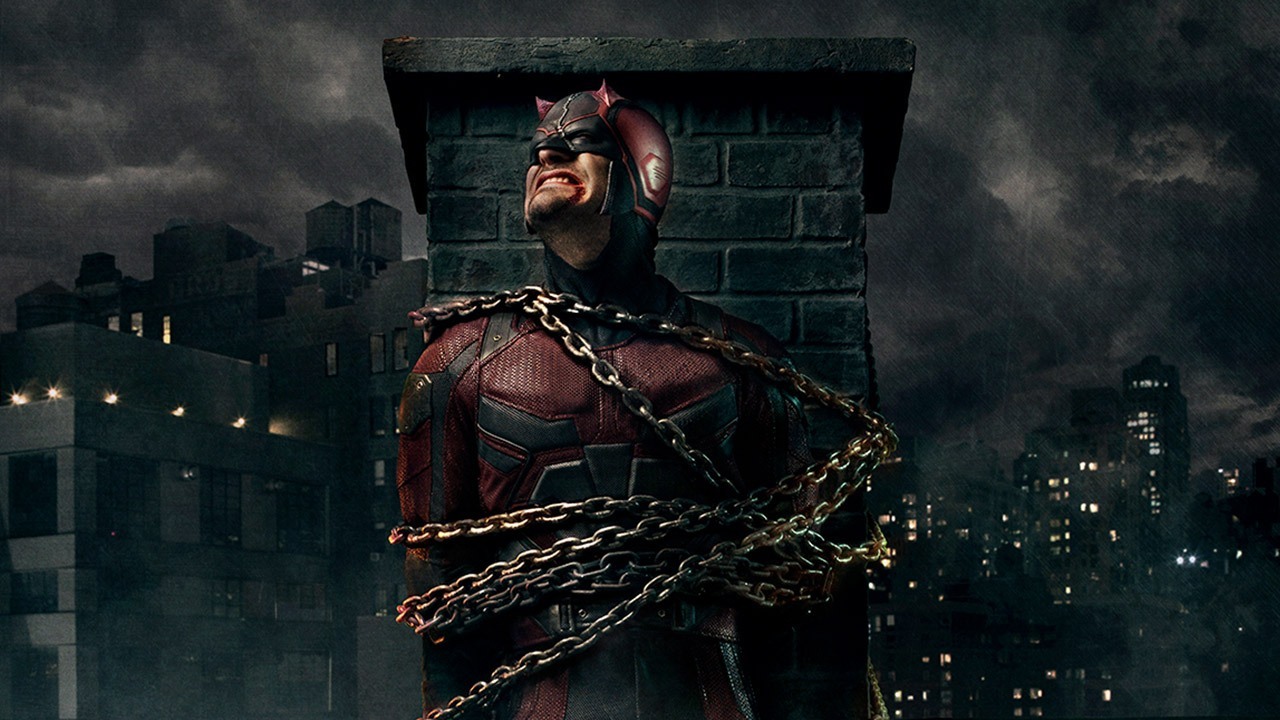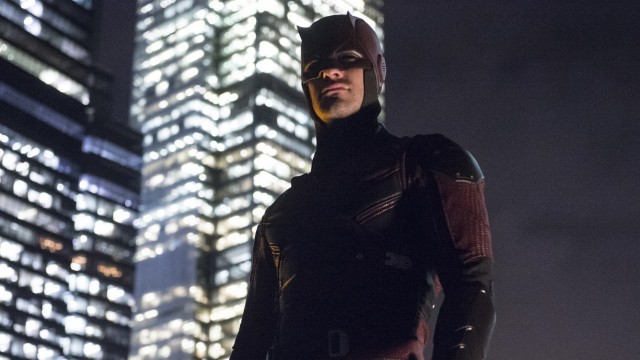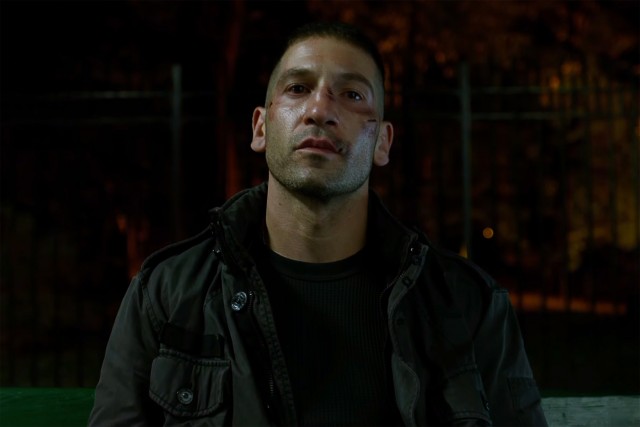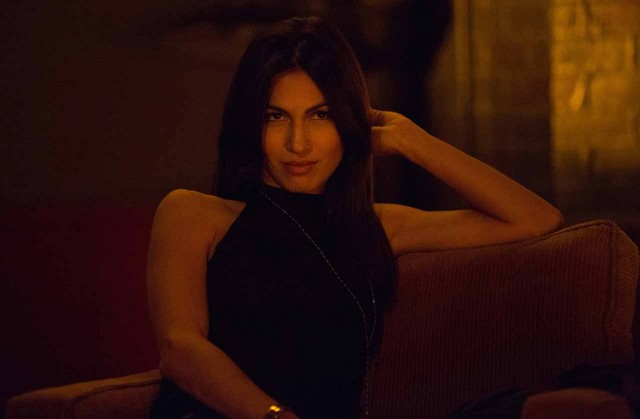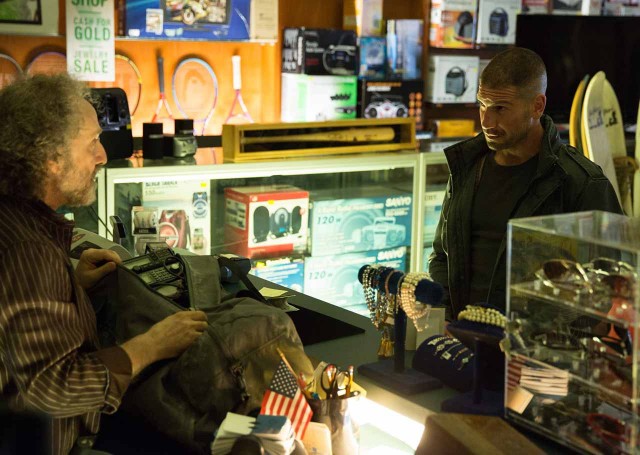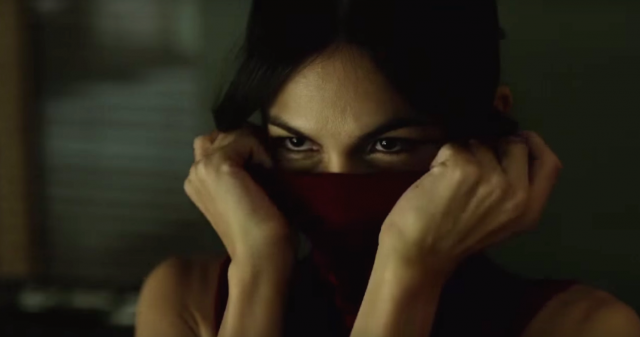NOTE: This review may contain mild spoilers for the second season of “Daredevil.” With that said, the review is written to accommodate those who have not yet watched the season, and as such, will avoid discussion of major plot developments.
When Netflix first threw open the doors to a darker, seedier underbelly of the Marvel Cinematic Universe with last year’s first season of Daredevil, venturing the normally PG-13 MCU into dark, violent R-rated territory for the first time, it certainly made a big splash. Ultimately growing the fastest audience of adoring fans and viewers of any Netflix Original Series to date, Daredevil’s debut season soon became a new cornerstone of Netflix’s marketing, in turn also paving the way for the next of its sibling Marvel shows on Netflix, Jessica Jones, which offered its own excellent first season that somehow seemed to have lightning striking twice for the Marvel/Netflix collaboration, even in a considerably different package.
With Daredevil leading the charge of exploring a sinister slice of the MCU meant explicitly for adults however, it’s now time to return to the tale of the original hero of Hell’s Kitchen, The Man Without Fear himself, as Daredevil debuts its anticipated second season. With the threat of Wilson Fisk now neutralized, and the neighbourhood starting to rebuild and embrace its new vigilante hero, things are starting to look up for Matt Murdock, whose civilian identity is also basking in the increased adoration of a public that saw his law firm put Fisk behind bars.
As with any of Marvel’s highly beloved superheroes however, the peace and happiness inevitably doesn’t last. Even with Fisk out of the picture, Hell’s Kitchen now finds itself gripped by fear of a new menace, a man who seemingly murders without remorse, and who has enough firepower and rage to take out virtually all of Hell’s Kitchen if he deems fit. Rather than introduce another season-long villain to try and fill the impossibly big shoes of Daredevil arch-nemesis, Fisk in Season Two, especially when he was portrayed so brilliantly by Vincent D’Onofrio last season, Daredevil makes the risky, but ultimately inspired choice to avoid a central antagonist in its second batch of episodes, instead plunging its title hero into a whole new world of moral greys, exploring characters who don’t really fall into traditional, “Good” or, “Evil” definitions, including Daredevil himself to a point.
Obviously, the biggest draw throughout the marketing of Daredevil’s second season is the introduction of another beloved Marvel hero to the MCU, one of the most vicious and violent heroic personalities in the entire Marvel Universe in fact, The Punisher! Jon Bernthal is the latest actor to inhabit the role of Frank Castle, and his Punisher portrayal is quite unlike prior incarnations, which focused more on the badass, brutal and cold side of the character. Bernthal’s Punisher however is a man that is perhaps less, “Cool” than some of his predecessors (namely the standout turn in the role by Thomas Jane in the 2004 Punisher movie from Lionsgate), but compensates by being more effectively grounded and uncomfortably logical in even his mass murders. Bernthal’s Punisher is easily the most unnerving and terrifying of any Punisher portrayal to date, not because he’s a deadly killer (though he most certainly is that!), but because he’s eerily, undeniably relatable, and sometimes downright sympathetic!
Daredevil brilliantly makes use of this interplay between Daredevil, a violent, masked hero with an unknown identity who nonetheless refuses to use lethal force on his victims, and Punisher, an ultra-lethal soldier of vengeance who is feared and distrusted by most of the public in Hell’s Kitchen, but is honest about who and what he is, and ironically operates with more transparency than Daredevil. Some of the strongest scenes throughout Season Two of Daredevil are not Matt and Frank trading blows (even if this does happen every so often), but simply musing to each other on rooftops and in dark alleys. As much as Daredevil comes off as the nobler hero for his principles, many of his principles are based on faith and trying to see the best in people, which is a system that he can defend, but not explicitly justify. In Frank’s mind, that’s arbitrary, since Frank approaches his victims from the other side of the spectrum, believing that in embracing a lifestyle that actively hurts and kills other people, criminals waive their rights to be treated better than their victims, which is why Frank sees no issue with killing them.
Neither man is right or wrong, and that’s why these Daredevil/Punisher scenes are so consistently fantastic, especially considering how superbly Bernthal makes his Punisher a complex vigilante who isn’t merely an angry thug, but a surprisingly stable, astonishingly reasonable family man who has a skill, and sees a means to put that skill to use for the greater good. The season also avoids giving Frank a direct origin story to boot, instead having him open up about pieces of his family’s awful murder whenever it’s appropriate to the story, and letting things like his abandoned, still-intact family home lead viewers to fill in the blanks themselves.
This is remarkably effective, and in turn helps Frank remain sympathetic, since we never fully grasp the grisly horror of what he lived when his wife and two children were brutally gunned down before his eyes, and that’s a big part of why his character feels so effectively tragic. Maybe this backstory will be explored more if Punisher gets his own Netflix series, as rumoured (and the season certainly isn’t shy about indicating that this is not the last we’ll see of Bernthal’s Punisher in the MCU!), but for now, the fact that much of Frank’s pain is left up to audience imagination helps make him more superbly ambiguous, and that will make you want to see more of his character in the future.
The Punisher is not the only ambiguous Marvel hero to make their debut in the MCU during this season of Daredevil as well, as anti-heroine, Elektra also joins Marvel’s shared live-action universe in this season, after being teased in a throwaway line of dialogue during Season One. Elodie Yung portrays an Elektra that is a bit of a deviation from the more familiar Elektra of Marvel Comics lore, but also one that continues to push Matt not against a villain, but against his own struggle to find moral harmony.
Instead of just being a sexy assassin that Daredevil sometimes runs with, the show takes Elektra one step further, and makes her that irresistible ex-lover that your higher mind knows is a bad influence, but your base instinct just can’t seem to abandon the desire for. Elektra represents a primal, dangerous temptation for Matt’s character, and she presents the greatest challenge to his having to balance his two identities as Matt Murdock and Daredevil, greater than anything Matt ever faced during his budding law career with Foggy Nelson and Karen Page in Season One. Both Foggy and Karen are predictably back for Season Two, and given awesome, morally complex arcs of their own as well, particularly since Foggy knows of Matt’s identity as Daredevil, while Karen does not, leading to lots of dramatic irony for Karen’s character especially, particularly since she forms an unexpected kinship with Frank, and proves to be the surprising voice of reason for why The Punisher exists, and what possible hand that Daredevil may have had in it, effectively making her the antithesis of Elektra’s devil-may-care disposition.
Without spoiling anything, Elektra has some pretty big links to Matt’s past, even long before he donned the mantle of Daredevil, and she also leads into some neat payoffs to quite a few teases from Season One that were ultimately not resolved before. If you’re familiar with the character of Elektra from prior Marvel media, and you’ve already watched Season One of Daredevil in its entirety, then you may ultimately be able to predict who the real threat to Hell’s Kitchen ends up being, since it’s obviously not The Punisher, even if city officials would have the public think so. Despite that, the Elektra arc nonetheless sustains itself with plenty of fantastic twists, especially when Yung’s portrayal is equal parts sultry and heart-wrenching. Like The Punisher, Elektra proves more difficult than you would think to refuse the will of, even when you know that she’s getting her former boyfriend into a mess far bigger than The Punisher, Fisk, or anything else that he could previously fathom!
Of course, this sort of thing won’t leave viewers wanting for action, and the action manages to be cranked up even more in Season Two of Daredevil as well! Even the many standout fight scenes of Season One are often topped in Season Two, with stunning action choreography that represents some of the finest stunt work in the history of the MCU, once again. Even that amazing hallway fight sequence from Season One of Daredevil is given an equally mind-blowing action sequence early in the season, and one that may even ultimately top it! The thrills feel a little more direct and consistent than the more dramatic and philosophical style of Season One, which isn’t any better or worse, and is simply a cool, distinct direction for Season Two, no doubt the result of Daredevil changing showrunners between its first and second seasons.
Even with the beefed-up action in Season Two however, that’s not to say that the drama suffers. Even beyond those previously-mentioned highlight dialogues between Daredevil and Punisher, Season Two of Daredevil is packed with excellent dramatic character arcs, especially in how effectively the Punisher conflict is also woven into Matt Murdock’s civilian identity with Foggy and Karen, not just with the inevitable conflict with Daredevil. Despite the many large-scale and riveting personalities and conflicts all being juggled throughout the season, the storytelling always feels smooth, well-paced, and never over-stuffed, which is kind of amazing.
Even with Fisk no longer the show’s villain (for now, at least), Daredevil still feels like it effectively finds a way to increase its scope and ambition in its second season, nonetheless managing to mine new conflicts, new drama and new thrills without missing a beat, even without needing to rely on a central antagonist for most of the season. Even then, the show manages some surprisingly fun moments of humour amidst the violence and misery as well, which allows it to still feel like a part of the upbeat MCU, even as it takes on darker, gorier subject matter than Marvel’s movies and syndicated TV shows.
In the end, Daredevil’s outstanding first season has been proven to be no fluke. The second season of the show ups the thrills, dives deeper into the drama, and yet never does so at the expense of the fun, entertainment value and action-packed appeal. Season Two of Daredevil feels like it veers closer to prioritizing more direct superhero storytelling over the crime drama-driven direction of Season One, but it’s just as excellent in the end, and continues to have Daredevil standing as one of Netflix’s best shows overall, right alongside Marvel’s other current Netflix series, Jessica Jones. Even with its change in showrunners after Season One wrapped, Daredevil continues to blow all expectations out of the water in its sophomore year, and with this new season being a lot less shy about teasing future developments with the character to come, it’s a wonderful thing that The Man Without Fear’s work is still far from finished!

